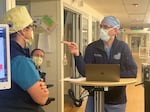Oregon Gov. Kate Brown announced on Friday that she would be sending up to 1,500 Oregon National Guard troops to help hospitals deal with the surge in delta variant COVID-19 cases.
“I cannot emphasize enough the seriousness of this crisis for all Oregonians, especially those needing emergency and intensive care,” she said.
“When our hospitals are full with COVID-19 patients, there may not be room for someone needing care after a car crash, a heart attack, or other emergency situation.”
The governor said on Friday there are 733 Oregonians hospitalized with severe cases of COVID-19, including 185 in intensive care units.

OHSU doctor David Zonies says out of 80 ICU beds only two or three are open. And staffing those is a problem because of the nursing shortage.
Courtesy: Dr. David Zonies
“The harsh, and frustrating reality is that the Delta variant has changed everything. Delta is highly contagious, and we must take action now,” she said.
Beginning August 20, an initial 500 Guard members will be deployed to hospitals around the state to provide logistical support as materials handlers and equipment runners, as well as assisting with COVID-19 testing and other hospital operations.
Brown pleaded with Oregonians to get vaccinated if they haven’t yet, “If you have been waiting to get vaccinated, go do it today. Vaccines are safe, effective, and widely available. And, when you go out in public today, wear a mask. Masks are a simple and effective way for all of us to help slow the spread of COVID-19.”
Many hospitals run close to capacity most of the time as they care for patients with heart attacks, strokes and normal health conditions.
Oregon Health & Science University trauma surgeon Dr. David Zonies said on Friday he had maybe three intensive care beds available, out of 80.
“Historically we’ve never had to have a waitlist for people to come in for a critical care bed and that’s what we’re now experiencing,” said Zonies, who cares for patients receiving extracorporal life support in the OHSU ICU.
OHSU like many health systems is getting patients referred from hospitals across Oregon that have reached their capacity because of the delta variant.
“We have patients that are severely ill in our emergency department that need to be in an ICU,” Zonies said. “They need to be in an inpatient bed and that’s what we’re dealing with now.”
Zonies said while the hospital has 80 ICU beds, it can’t staff all of them because of the shortages of nursing staff. “And it’s not just OHSU, this is a nationwide problem,” Zonies said.
Columbia Memorial in Astoria has canceled elective surgeries. Legacy Health system plans to reinstitute visitor restrictions on Monday.
“It is like watching a train wreck coming and knowing that there’s an opportunity to switch tracks, yet we feel helpless while we watch unnecessary loss of life,” Zonies said. “That is why it is essential that we all do our part to get vaccinated and wear a mask indoors.”
Dr. Grant Niskanen of Sky Lakes Medical Center in Klamath Falls said he’s seeing younger, sicker patients. “We had one person a couple weeks ago that got a lung transplant ... we have a second person that now is being evaluated for a lung transplant, and when I talk about the patients — like nine or 10 that are currently in our hospital, that’s for an acute infection — that’s not talking about the four or five that have been here for 20 plus days, who are no longer infected, but still need such amounts of high flow oxygen that we’re unable to send them home.”
Niskanen said the key to stopping the virus is to get vaccinated, “If we all were vaccinated. This would shut down the spread of the virus and shut down the mutations and the variants that are occurring.”
Editor’s note: This story has been updated to correct Dr. David Zonies’ medical specialty. He is a trauma surgeon.
